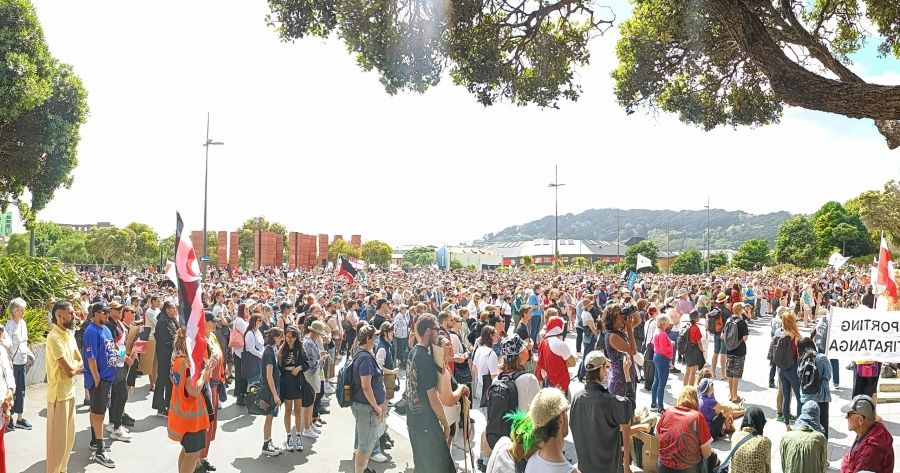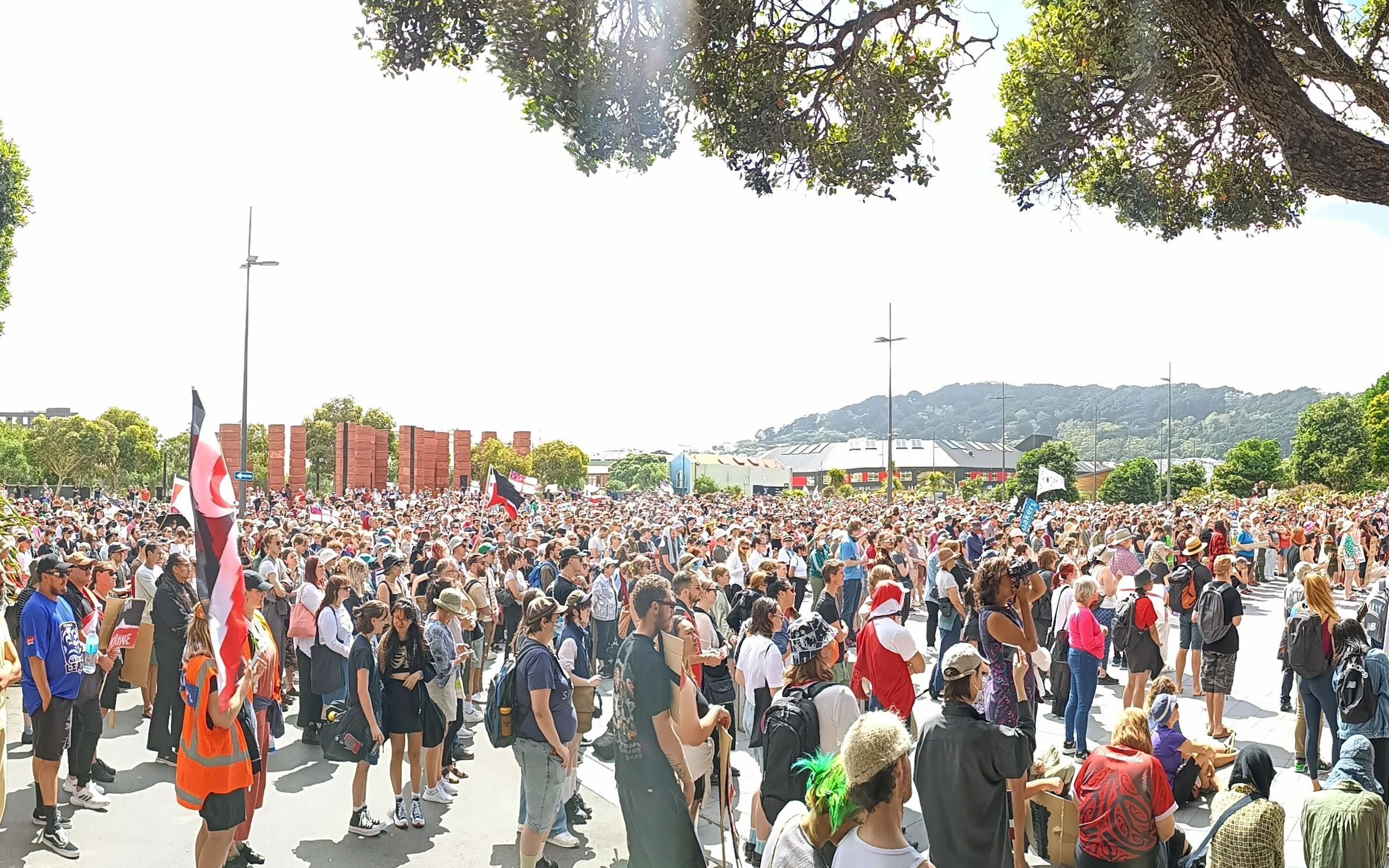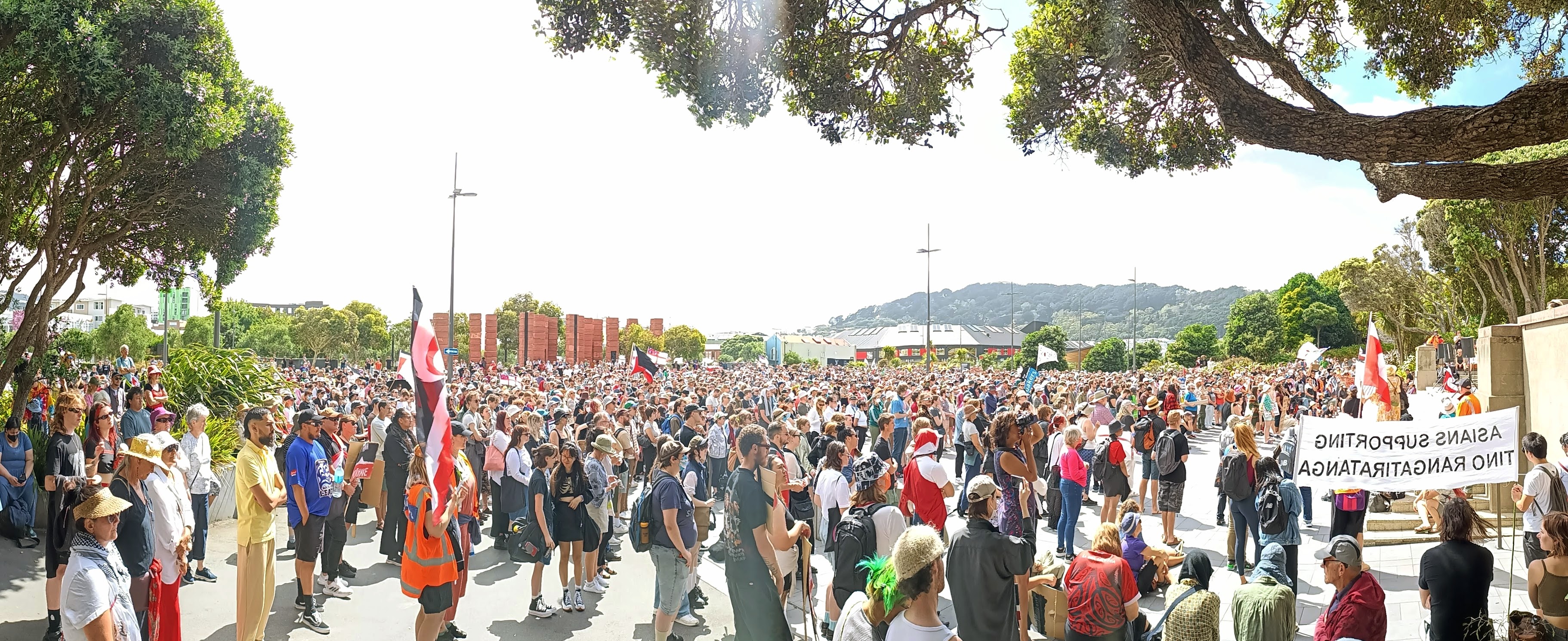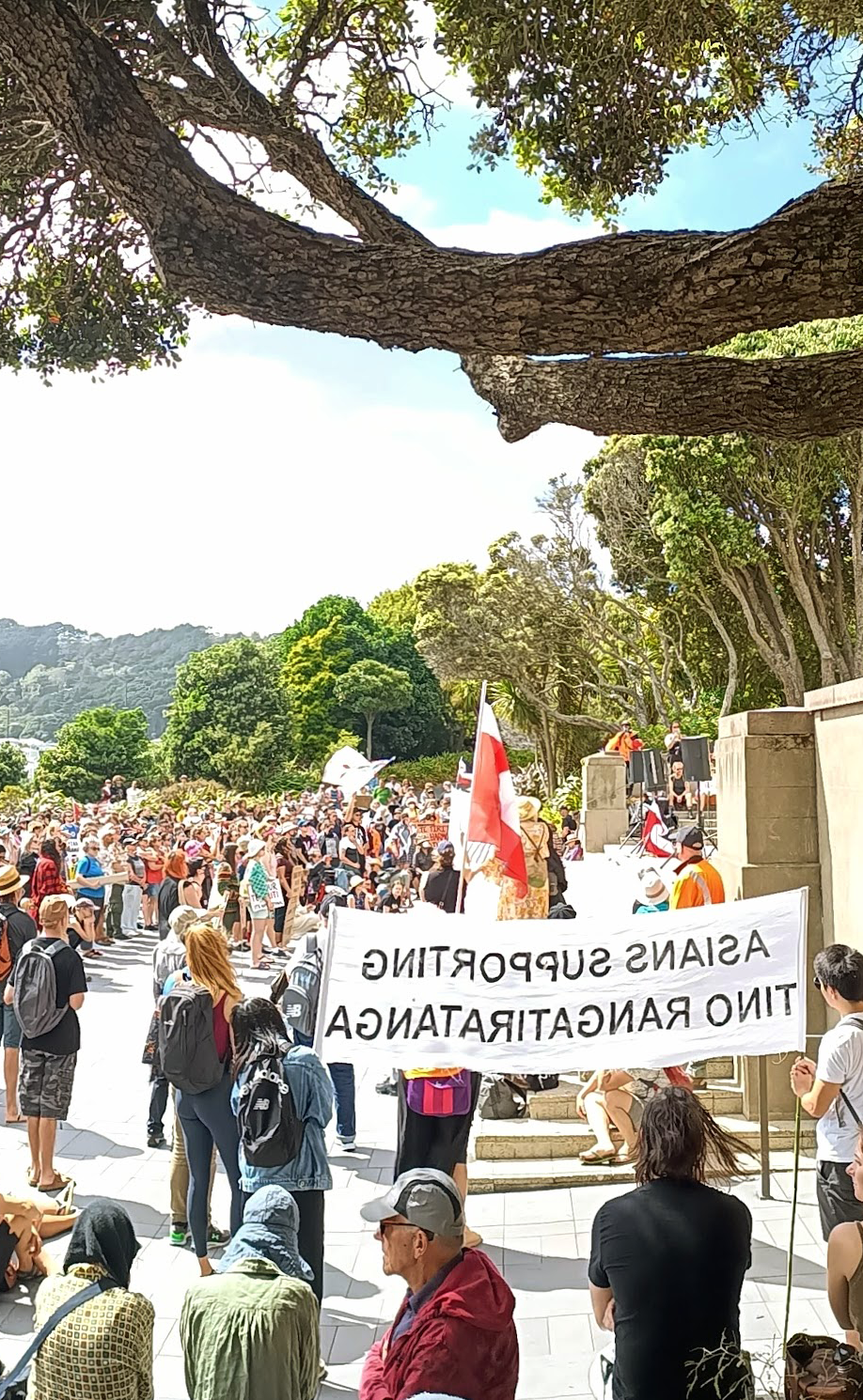
- Free Article: No
- Contents Category: Commentary
- Custom Article Title: Whither Waitangi? Biculturalism on the rocks in New Zealand
- Review Article: No
- Article Title: Whither Waitangi?
- Article Subtitle: Biculturalism on the rocks in New Zealand
- Online Only: No
- Custom Highlight Text:
From across the ditch, New Zealand can look like a place where settlers and Indigenous people have forged a successful, postcolonial modus vivendi. The image conceals more than it reveals. As in Australia, relations between Indigenous people and the state are fraught. At the November 2023 election, right-wing minority parties won electoral support by rejecting what they have characterised as special privileges to Māori. And a long-standing, bipartisan consensus on ‘biculturalism’ is breaking down.
- Featured Image (400px * 250px):

- Alt Tag (Featured Image): ‘Whither Waitangi? Biculturalism on the rocks in New Zealand’ by Miranda Johnson
To critics of the Ardern government’s policies, co-governance looked like a special privilege to Māori as a race and disproportionate power to iwi. During the 2023 election campaign, two smaller right-wing parties – ACT (the Association of Consumers and Taxpayers) and New Zealand First – argued against such ‘privilege’. An ACT spokesperson claimed that the ‘Three Waters’ reforms were ‘divisive, dangerous and [that it is] totally inappropriate to give iwi a seat at the table just because of who their ancestors were’. Such claims propelled support for ACT and New Zealand First, which together won nearly fifteen per cent of the vote and have formed a three-way coalition with the senior party, National. Under this government, the Māori health authority has been disestablished and the Three Waters legislation overturned. Further, at the behest of their coalition partners, Luxon’s National Party has agreed to support a parliamentary bill through to select committee that will revisit ‘Treaty principles’, particularly ‘partnership’.
The idea of such principles was first mandated in the Treaty of Waitangi Act 1975 that created the Waitangi Tribunal to investigate Māori grievances about breaches of the Treaty by the Crown. Norman Kirk’s Labour cabinet (1972-74) believed that such principles could be derived from the Treaty in order to aid in its interpretation. The Treaty was itself a very brief document, comprising a preamble and three short articles. The English language text was hastily translated into the Māori language, which is the version that most rangatira signed. From the 1970s on, the status of this translation has been much debated. Was it accurate, or a ruse? Was it too quickly undertaken and poorly explained to those gathered at the approximately fifty meetings held across the islands? Did the British authorities bear humanitarian intent towards Māori? Could anyone have predicted what would happen next – mass white settlement and the almost complete dispossession of iwi?
In recent political life, questions have increasingly focused on sovereignty. Did rangatira cede their sovereignty to the British Crown, as the English version stated? Or did they retain their rangatiratanga – the exercise of chiefly authority – as the Māori language text promised? For their part, historians and other scholars have often regarded the matter of sovereignty as a problem to be investigated in terms of the context of what was said and understood in the 1840s. This is because the Treaty – and the Māori text in particular – has come to be viewed as a founding, constitutional document. Yet it was what was happening in late-twentieth century New Zealand that illuminated the problem of sovereignty and Indigenous rights. Examining this more recent context is important for understanding the marked shift in policy alignments today.
In the 1980s, New Zealand was re-founded in terms of biculturalism. This idea was adopted as official policy by the state as a means of recognising that New Zealand was founded by two peoples, with two cultures, that did not have to become one. It followed widespread activism in the 1970s by Māori, who protested cultural assimilation, demanded land rights, and asserted the value of Indigenous language and culture. The policy of biculturalism, which in part was a strategy for containing the threats posed by Māori dissent to national harmony, was a striking departure from the previous national idea of unification-as-assimilation.
The identification of Treaty principles became another strategy for managing the claim of Māori sovereignty. Crucial here was the principle of ‘partnership’ between Māori and the Crown. Partnership is a vague term. It does not necessarily impute equality, nor does it propose how power might be shared or negotiated between the partners. A principle of partnership does not recognise a claim of unceded Indigenous sovereignty. Furthermore, it has not been codified in law or described in a constitutional document (New Zealand does not have a single written constitution). Rather, the substance of partnership is evolving in judicial decisions, policy, and Waitangi Tribunal reports. In these institutions, partnership is understood to confirm that iwi Māori have a distinctive political relationship to the Crown that is based on their consent to the Treaty as iwi. This relationship is one that needs to be recognised in ways that may chafe against other normative principles of liberal democracy such as equality and individual liberty.
 Waitangi Day Solidarity Hīkoi, Te Whanganui-A-Tara Wellington, 2024 (Pakoire via Wikimedia Commons)
Waitangi Day Solidarity Hīkoi, Te Whanganui-A-Tara Wellington, 2024 (Pakoire via Wikimedia Commons)
The establishment of biculturalism took place in the context of other radical reforms of the state and economy. In the 1980s, David Lange’s Labour government opened up what had been a highly protected national economy to globalisation, deregulated financial markets, devolved significant areas of public administration, and sold off key state assets. It also reformed migration policy, focusing less on race or culture and more on economic contributions. The pairing of neo-liberalism with the local project of biculturalism, including support for the Waitangi Tribunal process and the negotiation of major Treaty settlements with iwi, was maintained by successive National- and Labour-led governments through the 1990s until Ardern’s Labour-led coalition took power in 2017.
By then, the complex effects of the 1980s reforms were being felt throughout New Zealand society. High rates of child poverty, particularly among Māori and Pacific families, declining literacy rates, long hospital waiting lists, and a younger generation locked out of home ownership, all brought the market orientation into sharp question. Changes in migration policy radically changed the ethnic and cultural make-up of the country. Today, around a quarter of New Zealanders are foreign-born, may have little familial connection to the history of colonisation, and do not see themselves represented in the bicultural binary which by default imagines the second culture as that of Pākehā, or white settler descendants.
Significantly, iwi Māori are now in a ‘post-Treaty settlement’ phase of growth and development. Most iwi have negotiated settlements with the Crown about historic breaches of the Treaty and are investing settlement moneys in property, forestry, dairy, and tourism. Ten post-settlement iwi are estimated to hold assets worth over NZ$8 billion. Ngāi Tahu (the major iwi of the South Island) alone manages assets of nearly $2.3 billion. Overall, the Māori economy is valued at seventy billion and is set to grow to $100 billion by 2030. (To put these values in perspective, in 2023, New Zealand’s GDP was just over $400 billion in total.)
In other words, if biculturalism was intended to manage dissenting Māori activism in the 1980s, today a very different political reality is setting in. Tribes are no longer only claimants to state power, but are developing their own human and economic capacities within the nation and internationally. Tribal capitalism makes Indigenous power and authority real in ways that may be less dependent on the state but that nonetheless may seek to challenge governing arrangements and shape policy making from a position of growing economic strength. On May 31, activist groups, supported by Iwi leaders, called for a national strike by all Māori and their allies to ‘prove the might of our economy’. Yet this reality is not always appreciated in the wider society, where non-Māori often view Māori primarily as victims of dispossession. The Māori Party, which won six out of the seven separate Māori electorate seats in the last election – the party’s best result ever – is notably the only party to make its position on Indigenous self-determination clear. Ultimately, it aims to create a separate Māori parliament.
Ardern’s Labour turned its fortunes around in 2017 on the promise that it would address socio-economic inequality, and child poverty in particular. The strategy was in part motivated by a return to ideas of redistribution – though Ardern’s government did not engage in substantive enough tax reform to achieve this. Another shift involved creating new bureaucracies for health and welfare. At the same time, as mentioned earlier, the Labour coalition recommitted to key aspects of biculturalism. Following a landslide victory in 2020, Labour, now able to govern alone, somewhat paradoxically tried to connect re-centralisation to the idea of power-sharing with iwi Māori (tribes), according to the principle of Treaty partnership.
The Labour government used the less familiar term of ‘co-governance’ to describe this power sharing. The term was adopted from other developments such as the co-management of natural resources, including waterways and national parks, by iwi and local councils (or the Department of Conservation). Those arrangements have often been negotiated as part of Treaty settlement packages, in lieu of returning property rights directly to iwi over places and resources that are used by both Māori and non-Māori. Such arrangements are not well understood by most New Zealanders. Despite this unfamiliarity, Labour applied the term ‘co-governance’ to the national-level initiatives mentioned earlier (the new health authority and water management), which were reviled by some as denoting racial separatism but celebrated by others as evidence of a progressive, postcolonial politics of recognition.
ACT’s bill proposing new Treaty principles responds to what the party and its supporters argue is a profound threat to liberal democracy in the form of co-governance. The party disputes the claim central to the re-founding of Aotearoa New Zealand as a postcolonial state: that Indigenous peoples’ distinctive rights are premised on their prior occupation and/or ownership of the lands that settler colonists usurped. The party’s intentions are laid out on its website, where it proposes its own Treaty principles matched to its libertarian political identity. These include a reduction in the role of government; a free-market orientation that upholds individual rather than collective property rights and an ethos of individual responsibility; and an emphasis on rights of equal, individual, citizenship held by all New Zealanders. Further, the repudiation of the political terms of partnership/co-governance has been accompanied by claims on the part of ACT and New Zealand First that biculturalism has gone too far and that Māori language should not be so widely used in the public service – or on road signs. Further highlighting the political complexity of the present moment, some of the politicians leading these attacks are themselves Māori – including the New Zealand First leader Winston Peters and his deputy, Shane Jones, who is a fluent speaker of the Māori language. These figures have parallels in Australia, in the Indigenous politician Jacinta Nampijinpa Price and academic Anthony Dillon.
ACT’s proposed Treaty principles Bill has not yet been tabled in parliament. Its idea of a referendum on the same has been taken off the table, for now. The smaller parties’ success in persuading National to even contemplate such ideas highlights that a major policy realignment is underway that is undermining the previous bipartisan consensus on biculturalism.
Neither side of New Zealand politics is adequately reckoning with growing iwi power in an ever-diversifying country, one that is facing the headwinds of an unstable global economy and climate change. ACT does not propose undoing Treaty settlements (this would not be legally or politically feasible), and it does not explain how New Zealand governments should best engage with iwi as both economic and cultural entities that are mandated to represent their tribal memberships. Deracinated, market-led liberal individualism does not much help in facing the new reality.
For its part, the political left has not established a justification for power-sharing arrangements that is persuasive to a larger constituency. Such arrangements can no longer be justified solely in terms of a leg-up for Māori (a belief in the antipodean ‘fair go’ that underwrote the Kirk government’s support for creating a Waitangi Tribunal in the first place). As in Australia, advocates of co-governance refer to the 2007 United Nations Declaration on the Rights of Indigenous Peoples (UNDRIP), which recognises a non-secessionist right of self-determination. But such international reference points mean little to most New Zealanders.
Although the role of the Treaty in the public and political life of this country has produced a quite distinctive discourse of Māori rights and biculturalism, the reshaping of political partisanship in the 2020s bears striking similarities to trends in Australia. In the failed Constitutional Referendum of 2023, a right-wing attack on special rights for Indigenous Australians drew on echoes of the purportedly non-racial ‘fair go’. Yet in neither country does the right wing promise a return to the egalitarianism of the immediate postwar decades.
What has changed and what has not? Inequality in both countries continues, disadvantaging Indigenous families and communities the most, although class differences within the Māori population are becoming more significant. Despite the Ardern government’s promises and programs, child poverty rates have not improved significantly. Post-pandemic inflation and an economic recession, along with even longer hospital waiting lists, suggest that experiments in postcolonial democratic practice that are not clearly spelled out may be ill-timed. Meanwhile, Indigenous corporate and tribal entities are investing in and developing their communities in ways that were unimaginable in earlier decades. Conceptual frameworks have not kept up with these radically changed circumstances. We urgently need new analyses that grapple with the global and local forces that have produced these unanticipated dynamics.
This article is one of a series supported by Peter McMullin AM via the Good Business Foundation.



Comments powered by CComment